Related Research Articles
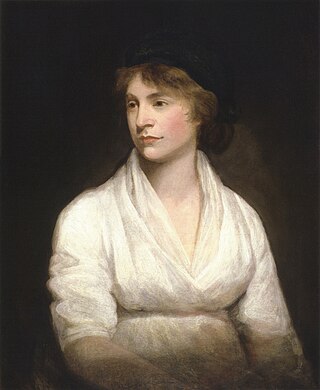
Mary Wollstonecraft was a British writer, philosopher, and advocate of women's rights. Until the late 20th century, Wollstonecraft's life, which encompassed several unconventional personal relationships at the time, received more attention than her writing. Wollstonecraft is regarded as one of the founding feminist philosophers, and feminists often cite both her life and her works as important influences.
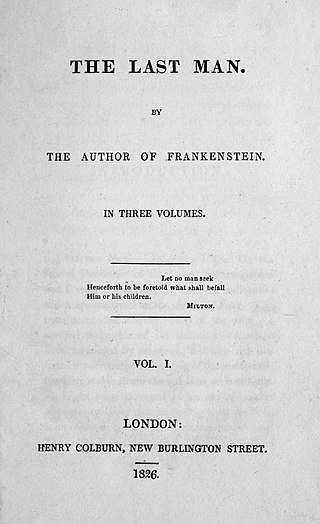
The Last Man is an apocalyptic, dystopian science fiction novel by Mary Shelley, first published in 1826. The narrative concerns Europe in the late 21st century, ravaged by the rise of a bubonic plague pandemic that rapidly sweeps across the entire globe, ultimately resulting in the near-extinction of humanity. It also includes discussion of the British state as a republic, for which Shelley sat in meetings of the House of Commons to gain insight to the governmental system of the Romantic era. The novel includes many fictive allusions to her husband Percy Bysshe Shelley, who drowned in a shipwreck four years before the book's publication, as well as their close friend Lord Byron, who had died two years previously.

William Godwin was an English journalist, political philosopher and novelist. He is considered one of the first exponents of utilitarianism and the first modern proponent of anarchism. Godwin is most famous for two books that he published within the space of a year: An Enquiry Concerning Political Justice, an attack on political institutions, and Things as They Are; or, The Adventures of Caleb Williams, an early mystery novel which attacks aristocratic privilege. Based on the success of both, Godwin featured prominently in the radical circles of London in the 1790s. He wrote prolifically in the genres of novels, history and demography throughout his life.

Sarah is a biblical matriarch, prophet, and major figure in Abrahamic religions. While different Abrahamic faiths portray her differently, Judaism, Christianity, and Islam all depict her character similarly, as that of a pious woman, renowned for her hospitality and beauty, the wife and half-sister of Abraham, and the mother of Isaac. Sarah has her feast day on 1 September in the Catholic Church, 19 August in the Coptic Orthodox Church, 20 January in the LCMS, and 12 and 20 December in the Eastern Orthodox Church.

Ishmael was the first son of Abraham, according to the Abrahamic religions. His mother was Hagar, the handmaiden of Abraham's wife Sarah. He died at the age of 137. According to biblical tradition, he is the ancestor of the Arabs.

According to the Book of Genesis, Hagar was an Egyptian slave, a handmaiden of Sarah, whom Sarah gave to her own husband Abram as a wife to bear him a child. Abraham's firstborn son, through Hagar, Ishmael, became the progenitor of the Ishmaelites, generally taken to be the Arabs. Various commentators have connected her to the Hagrites, perhaps claiming her as their eponymous ancestor. Hagar is alluded to, although not named, in the Quran, and Islam considers her Abraham's second wife.
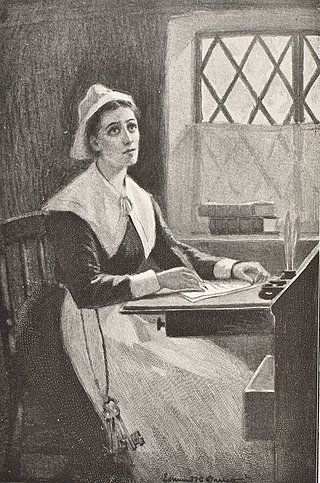
Anne Bradstreet was the most prominent of early English poets of North America and first writer in England's North American colonies to be published. She is the first Puritan figure in American Literature and notable for her large corpus of poetry, as well as personal writings published posthumously.
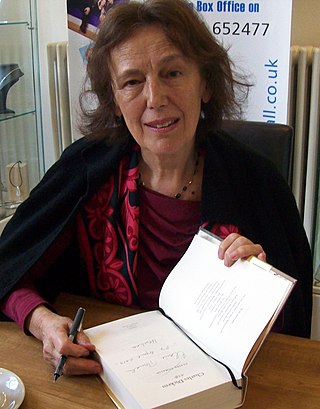
Claire Tomalin is an English journalist and biographer known for her biographies of Charles Dickens, Thomas Hardy, Samuel Pepys, Jane Austen and Mary Wollstonecraft.

Clara Mary Jane Clairmont, or Claire Clairmont as she was commonly known, was the stepsister of the writer Mary Shelley and the mother of Lord Byron's daughter Allegra. She is thought to be the subject of a poem by Percy Bysshe Shelley.
Mathilda, or Matilda, is the second long work of fiction of Mary Shelley, written between August 1819 and February 1820 and first published posthumously in 1959. It deals with the common Romantic themes of incest and suicide.
Betty T. Bennett (1935–2006) was Distinguished Professor of Literature and Dean of the College of Arts and Sciences (1985–1997) at American University. She was previously Dean of the School of Liberal Arts and Sciences and acting provost of Pratt Institute from 1979 to 1985. Among her numerous awards and honors, Bennett was a fellow of the National Endowment for the Humanities and fellow of American Council of Learned Societies. She won the Keats-Shelley Association of America - Distinguished Scholar Award in 1992 and was Founding President, Phi Beta Kappa, Zeta Chapter at American University. Born in Brooklyn, New York, Bennett graduated from Brooklyn College magna cum laude and later received a master's degree (1962) and PhD (1970) in English and American literature from New York University.

Valperga: or, the Life and Adventures of Castruccio, Prince of Lucca is an 1823 historical novel by the Romantic novelist Mary Shelley, set amongst the wars of the Guelphs and Ghibellines.
Frances Imlay, also known as Fanny Godwin and Frances Wollstonecraft, was the illegitimate daughter of the British feminist Mary Wollstonecraft and the American commercial speculator and diplomat Gilbert Imlay. Wollstonecraft wrote about her frequently in her later works. Fanny grew up in the household of anarchist political philosopher William Godwin, the widower of her mother, with his second wife Mary Jane Clairmont and their combined family of five children. Fanny's half-sister Mary grew up to write Frankenstein and married Percy Bysshe Shelley, a leading Romantic poet, who composed a poem on Fanny's death.
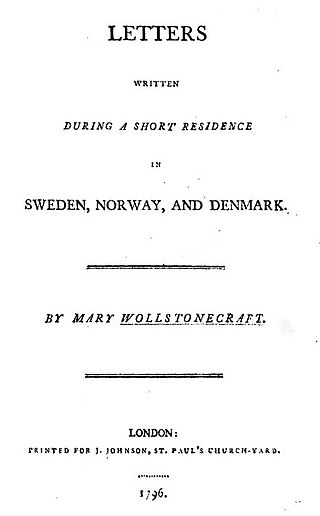
Letters Written During a Short Residence in Sweden, Norway, and Denmark (1796) is a personal travel narrative by the eighteenth-century British feminist writer Mary Wollstonecraft. The twenty-five letters cover a wide range of topics, from sociological reflections on Scandinavia and its peoples to philosophical questions regarding identity. Published by Wollstonecraft's career-long publisher, Joseph Johnson, it was the last work issued during her lifetime.
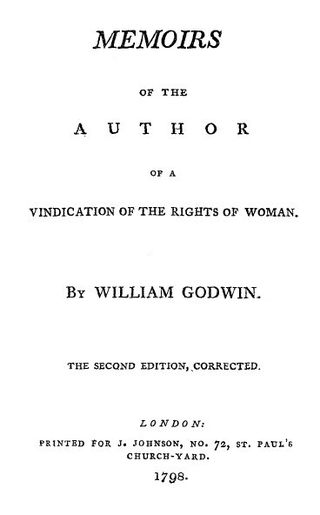
Memoirs of the Author of A Vindication of the Rights of Woman (1798) is William Godwin's biography of his late wife Mary Wollstonecraft. Rarely published in the nineteenth century and sparingly even today, Memoirs is most often viewed as a source for information on Wollstonecraft. However, with the rise of interest in biography and autobiography as important genres in and of themselves, scholars are increasingly studying it for its own sake.
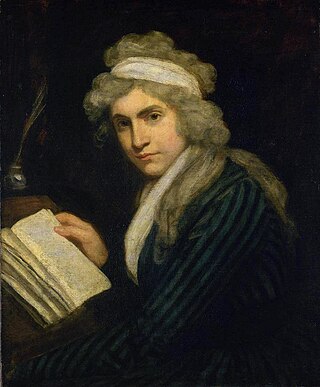
The lifetime of British writer, philosopher, and feminist Mary Wollstonecraft (1759–1797) encompassed most of the second half of the eighteenth century, a time of great political and social upheaval throughout Europe and America: political reform movements in Britain gained strength, the American colonists successfully rebelled, and the French Revolution erupted. Wollstonecraft experienced only the headiest of these days, not living to see the end of the democratic revolution when Napoleon crowned himself emperor. Although Britain was still revelling in its mid-century imperial conquests and its triumph in the Seven Years' War, it was the French revolution that defined Wollstonecraft's generation. As poet Robert Southey later wrote: "few persons but those who have lived in it can conceive or comprehend what the memory of the French Revolution was, nor what a visionary world seemed to open upon those who were just entering it. Old things seemed passing away, and nothing was dreamt of but the regeneration of the human race."

Midas is a verse drama in blank verse by the Romantic writers Mary Shelley and Percy Bysshe Shelley. Mary wrote the drama and Percy contributed two lyric poems to it. Written in 1820 while the Shelleys were living in Italy, Mary Shelley tried unsuccessfully to have the play published by children's magazines in England in the 1830s; however, it was not published until A. Koszul's 1922 scholarly edition. Whether or not the drama was ever meant to be staged is a point of debate among scholars. The play combines the stories of the musical contest between Apollo and Pan and that of King Midas and his ability to turn everything he touches to gold.

Mary Wollstonecraft Shelley was an English novelist who is best known for writing the Gothic novel Frankenstein; or, The Modern Prometheus (1818), which is considered an early example of science fiction. She also edited and promoted the works of her husband, the Romantic poet and philosopher Percy Bysshe Shelley. Her father was the political philosopher William Godwin and her mother was the philosopher and women's rights advocate Mary Wollstonecraft.
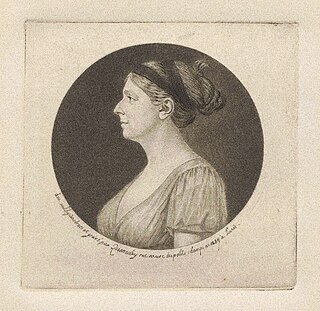
Margaret King (1773–1835), also known as Margaret King Moore, Lady Mount Cashell and Mrs Mason, was an Anglo-Irish hostess, and a writer of female-emancipatory fiction and health advice. Despite her wealthy aristocratic background, she had republican sympathies and advanced views on education and women's rights, shaped in part by having been a favoured pupil of Mary Wollstonecraft. Settling in Italy in later life, she reciprocated her governess's care by offering maternal aid and advice to Wollstonecraft's daughter Mary Shelley and her travelling companions, husband Percy Bysshe Shelley and stepsister Claire Clairmont. In Pisa, she continued the study of medicine which she had begun in Germany and published her widely read Advice to Young Mothers, as well as a novel, The Sisters of Nansfield: A Tale for Young Women.
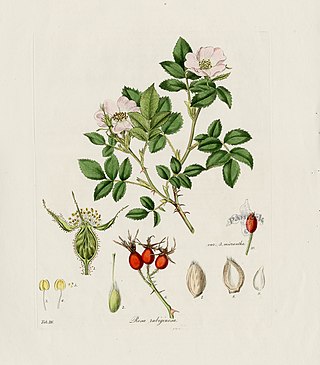
Frances "Fanny" Blood was an English illustrator and educator, and longtime friend of Mary Wollstonecraft.
References
- ↑ Endicott College Profile Archived May 27, 2010, at the Wayback Machine
- ↑ Massachusetts Book Award: Mistress Bradstreet "Book Awards 2006". Archived from the original on 2011-07-20. Retrieved 2010-07-23.
- ↑ Review of The Woman Who Named God
- ↑ Gordon, Charlotte (2009) The Woman Who Named God: Abraham's Dilemma and the Birth of Three Faiths. New York: Little, Brown, xv
- ↑ Gordon, Charlotte (2009) The Woman Who Named God: Abraham's Dilemma and the Birth of Three Faiths. New York: Little, Brown, xiv
- ↑ Altenberg, Karin (17 July 2015). "Vindication of a Righteous Woman". Wall Street Journal.
- ↑ "BBC Radio 4 - Book of the Week, Romantic Outlaws - the Extraordinary Lives of Mary Wollstonecraft and Mary Shelley, Escape and Elopement".
- ↑ Alexandra Alter (March 17, 2016). "'The Sellout' Wins National Book Critics Circle's Fiction Award". The New York Times . Retrieved March 18, 2016.